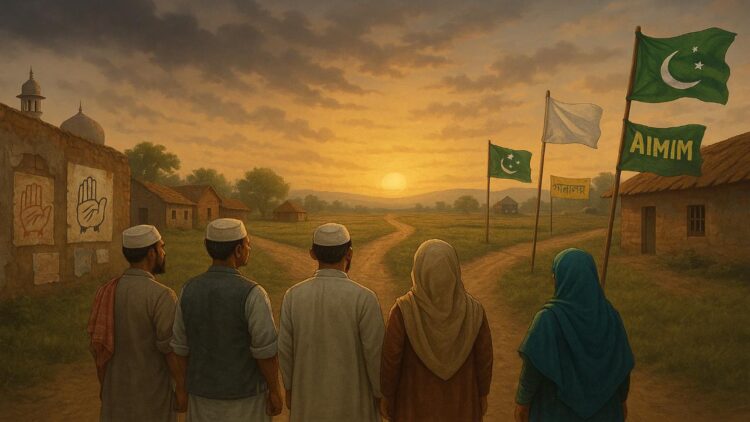Bihar Pasmanda Muslim Vote 2025: Whenever elections come close, every political party’s eyes are on a special vote bank Muslim vote bank. For decades it has been believed that Muslims in India are loyal to any particular party. But now there is a new movement within this vote bank, a new partition, which can shock political equations very deeply. And this is the partition of ‘Ashraf’ and ‘Pasmanda’ Muslims. You may have heard these names rarely, but now these names have come to the center of political debate. ‘Pasmanda’ a word that has a long social and economic story in itself. These are Muslims who are considered socially backward, Muslims from all castes like Kunjra, Ansari, Mansuri, Rhine, Tailor, Nai, Fakir. These number of Muslims of India are about 80 percent of the share, but they are still marginalized in terms of political representation.
When the vote banks begins to disintegrate
For years, it has been believed that Muslims unitedly vote for the Congress, sometimes regional parties. But now Pasmanda Muslims have started asking this question “We have voted for years, but what did you get?” Representation of the same ‘Ashraf’ Muslims, ie highly known Muslims like Syed, Sheikh, Pathan and Malik, who have had influence on both politics and religion. This question is arising faster in Bihar politics, as the Muslim population is about 17 percent here, and the number of Pasmanda Muslims is also the highest in it. Now that the 2025 assembly elections are near, this debate has become even more vocal, will Pasmanda Muslims create their own political identity?
NDA’s ‘Pasmanda Muslim’ strategy
In the past, Prime Minister Narendra Modi and BJP have talked many times about ‘Pasmanda Muslims’. The NDA government has tried to show it clearly that it does not just want to rely on the majority of the voters, but also wants to make the sections its own within the Muslim society who has been feeling politically neglected till now. In recent years, the government has tried to give priority in schemes and place local bodies to representatives of castes like Ansari, Mansuri, Tailor, Nai. In Bihar, BJP and JDU have also started giving a message through their leaders that Pasmanda Muslims are being heard.
Will this strategy work?
Political analysts believe that Pasmanda Muslims are not easy to do. Deadly neglect and marginality politics has made this class deeply skeptical. They are still unable to believe that their voice is actually being heard or it is all an election jumla.
But at the same time it is also true that a new generation is being prepared within the Pasmanda community which is politically more vocal. Through social media and ground movements, these youth are demanding their identity and stake.
RJD and Pasmanda Questions
The Rashtriya Janata Dal (RJD) remained on the equation for a long time. But within the Pasmanda community, this feeling is home that the RJD represented Muslims, but only high -ranking Ashrafs were preferred. Most of the Muslim faces emerged from the tenure of Rabri Devi till date were from the Ashraf class. In such a situation, Pasmanda section is raising the question, was ‘M’ in ‘My’ equation was only a mask?
AIMIM and Asaduddin Owaisi’s appeal
Asaduddin Owaisi of All India Majlis-e-Ittehadul Muslimeen (AIMIM) has spoken openly about Pasmanda Muslims. A major reason for the impact of AIMIM in the Seemanchal region of Bihar was the resentment of the Pasmanda community. Although this effect was later limited, AIMIM once proved that if the Pasmanda community was united, it can become a major political force.
Will a new political option be made?
In Bihar, the idea is emerging within the Pasmanda Muslims that why not form a separate political platform – a platform that only talks about Pasmanda rights, and also participate in elections. This idea has recently given rise to many small organizations and social forums. These organizations demand that political parties give priority to Pasmanda leaders in ticket distribution. And if not given, they can also adopt ‘Boycott’ strategy this time.
Will the trend of Muslim vote change?
If this movement of Pasmanda Muslims affect the electoral front, then there may be a big change in the politics of Bihar. This will not only be a matter of concern for RJD-JDU, but parties like BJP and AIMIM will also have to change their strategy. Till now the Muslim vote bank was seen as a ‘monolithic block’, but now cracks have started appearing in it. If these cracks have deepened, then it can change the political scenario of the whole of India.
‘Which side of Pasmanda Muslims trend?’ – This question has now become a sign of social change, not just an election analysis. Bihar election 2025 will not only decide to form the government, but will also decide whether the Muslim society recognizes the diversity within itself, and whether Pasmanda sewns its political status afresh. It is a knock of a change slow, but strong. And if this knock opens the doors, then a new chapter will be written in Indian politics.









